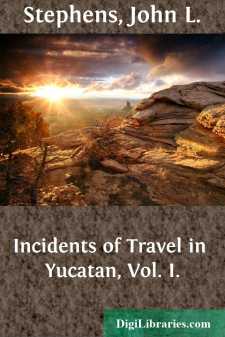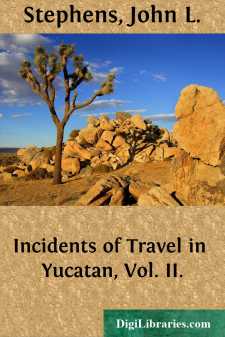Categories
- Antiques & Collectibles 13
- Architecture 36
- Art 48
- Bibles 22
- Biography & Autobiography 813
- Body, Mind & Spirit 142
- Business & Economics 28
- Children's Books 17
- Children's Fiction 14
- Computers 4
- Cooking 94
- Crafts & Hobbies 4
- Drama 346
- Education 46
- Family & Relationships 57
- Fiction 11829
- Games 19
- Gardening 17
- Health & Fitness 34
- History 1377
- House & Home 1
- Humor 147
- Juvenile Fiction 1873
- Juvenile Nonfiction 202
- Language Arts & Disciplines 88
- Law 16
- Literary Collections 686
- Literary Criticism 179
- Mathematics 13
- Medical 41
- Music 40
- Nature 179
- Non-Classifiable 1768
- Performing Arts 7
- Periodicals 1453
- Philosophy 64
- Photography 2
- Poetry 896
- Political Science 203
- Psychology 42
- Reference 154
- Religion 513
- Science 126
- Self-Help 84
- Social Science 81
- Sports & Recreation 34
- Study Aids 3
- Technology & Engineering 59
- Transportation 23
- Travel 463
- True Crime 29
Incidents of Travel in Yucatan, Vol. I.
by: John L. Stephens
Description:
Excerpt
Embarcation.—Fellow-passengers.—A Gale at Sea.—Arrival at Sisal.—Ornithological Specimens.—Merida.—Fête of San Cristoval.—The Lottery.—A Scene of Confusion.—Principle of the Game.—Passion for Gambling.—A deformed Indian.
The reader of my "Incidents of Travel in Central America, Chiapas, and Yucatan," may remember that the researches of Mr. Catherwood and myself in the last-mentioned country were abruptly terminated by the illness of the former. During our short sojourn in Yucatan, we received vague, but, at the same time, reliable intelligence of the existence of numerous and extensive cities, desolate and in ruins which induced us to believe that the country presented a greater field for antiquarian research and discoveries than any we had yet visited. Under these circumstances, it was a severe hardship that we were compelled to leave it, and our only consolation in doing so was the hope of being able to return, prepared to make a thorough exploration of this unknown and mysterious region. In about a year we found ourselves in a condition to do so; and on Monday, the ninth of October, we put to sea on board the bark Tennessee, Scholefield master, for Sisal, the port from which we had sailed on our return to the United States.
The Tennessee was a down-Easter of two hundred and sixty tons burden, turned out apparently from one of those great factories where ships are built by the mile and chopped off to order, but stout, strong, well manned and equipped.
Her cargo was assorted for the Yucatan market, and consisted of a heavy stratum of iron at the bottom; midway were miscellanies, among which were cotton, muskets, and two hundred barrels of turpentine; and on top, within reach of the hatches, were six hundred kegs of gunpowder.
We had a valuable addition to our party in Dr. Cabot, of Boston, who accompanied us as an amateur, particularly as an ornithologist. Besides him, our only fellow-passenger was Mr. Camerden, who went out as supercargo.
The first morning out we woke with an extraordinary odour of turpentine, giving us apprehensions that a barrel had sprung a leak, which, by means of the cotton, might use up our gunpowder before it came to the hands of its consignee. This odour, however, was traced to a marking-pot, which quieted our apprehensions.
On the evening of the fourth day we had a severe thunder-storm. This was an old acquaintance of ours in the tropics, but one which at that time we were not disposed to welcome very cordially. Peals of thunder broke and crashed close over our heads, lightning flashed across the dark vault of the heavens, lighting up the surface of the water, and making fearfully visible our little vessel, tossing and pitching, a mere speck in immensity; and at times an angry ray darted toward the horizon, as if expressly to ignite our gunpowder. We discussed, though rather disjointedly, the doctrine of conductors and non-conductors, and advised the captain to put a few links of a chain cable round the mainmast, and carry the end of it over the side. We had some consolation in thinking that six hundred kegs were no worse than sixty, and that six would do our business; but, in fact, at the moment, we were very much of opinion that lightning and gunpowder were the only dangers of the sea....



